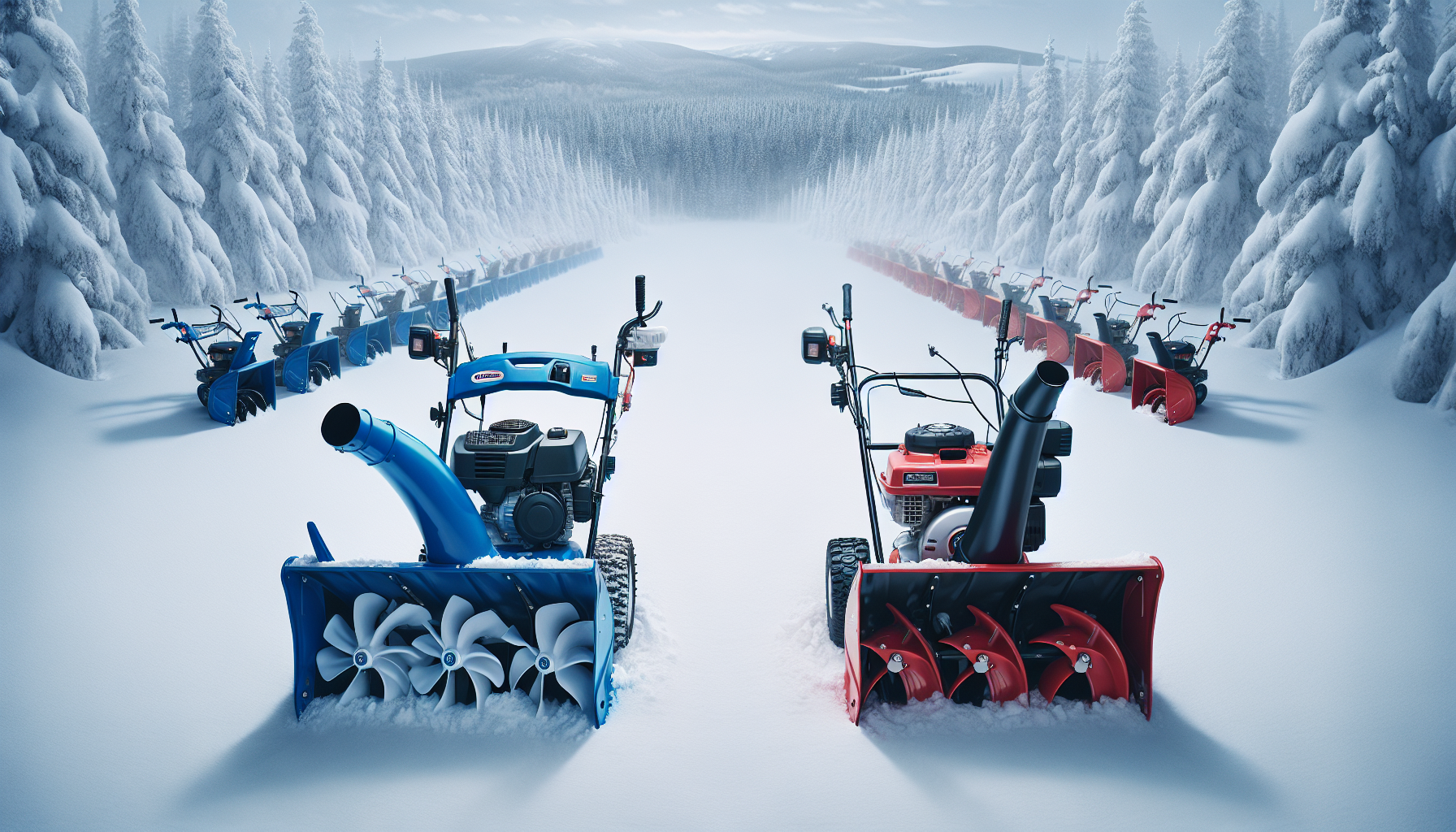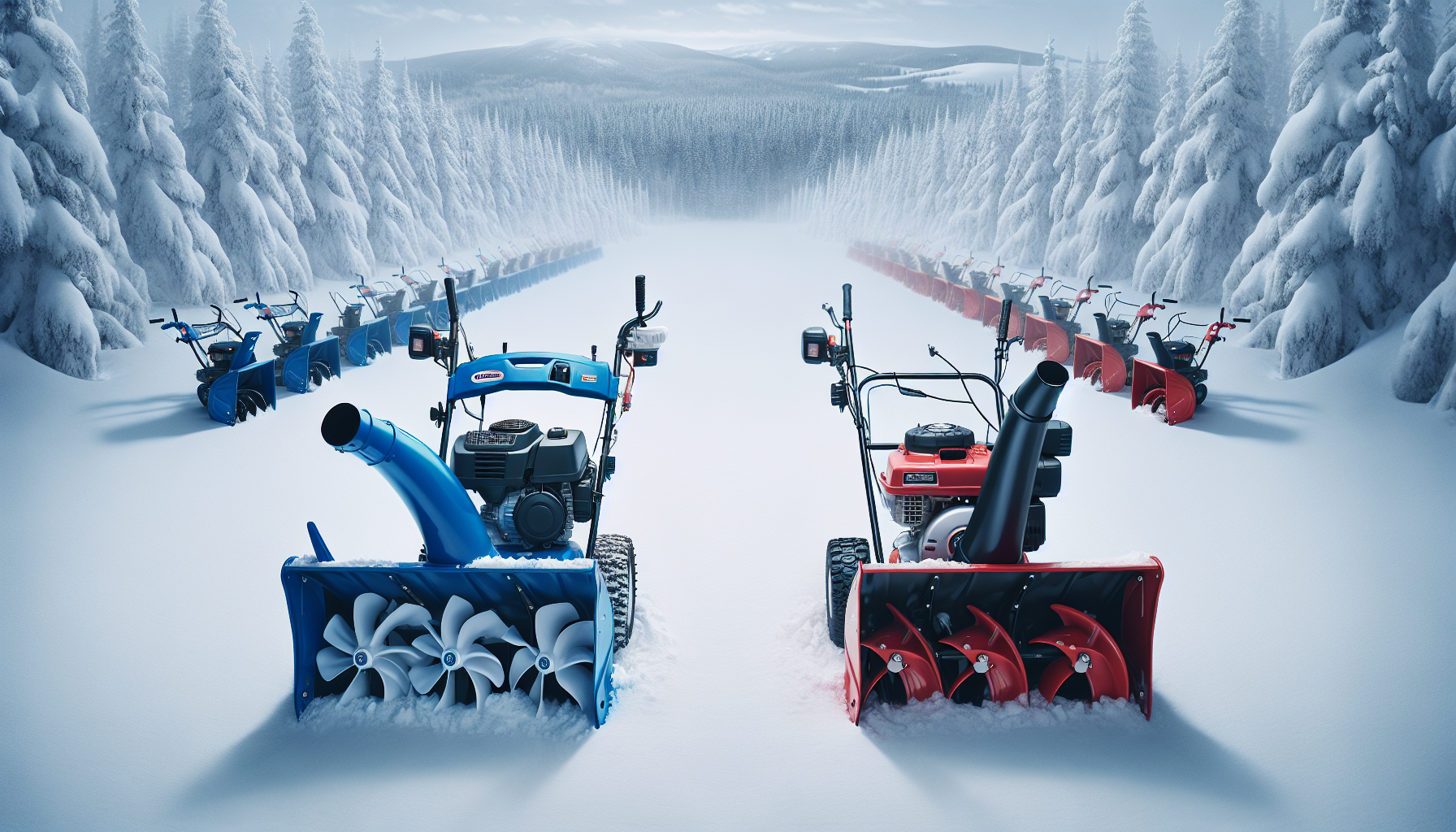If you’ve ever found yourself faced with mountains of snow blocking your driveway, you’ve likely considered investing in a snow blower. With options ranging from gas-powered to electric, it can be challenging to know which one will truly get the job done. In this article, we’ll explore the effectiveness of electric snow blowers compared to their gas counterparts. So, before you decide to brave the cold and shovel manually, let’s find out if electric snow blowers are up to the task of tackling even the toughest winter storms.

Power Source
Electric Snow Blowers
Electric snow blowers are an excellent alternative to their gas-powered counterparts. They are powered by electricity, which means you don’t have to worry about running out of fuel or dealing with the hassle of mixing oil and gas. Electric snow blowers are also more environmentally friendly, producing zero emissions and reducing noise pollution.
Gas Snow Blowers
On the other hand, gas snow blowers have long been the go-to choice for many homeowners and professionals. They are typically more powerful than electric models, making them better suited for heavy-duty snow clearing. Gas snow blowers also offer the benefit of portability since you are not bound by the length of an extension cord.
Performance
Snow Clearing Capacity
When it comes to snow clearing capacity, both electric and gas snow blowers are capable of getting the job done. However, gas-powered models generally have a larger intake width, allowing them to clear a wider path with each pass. This can be advantageous if you have a large driveway or need to clear a significant area in a short amount of time.
Throwing Distance
Gas snow blowers also tend to have a longer throwing distance than electric models. This means they can propel the snow further away from your clearing path, reducing the need to go over the same area multiple times. However, electric snow blowers have come a long way in recent years and now offer impressive throwing distances, making them a viable option for most snow clearing needs.
Power and Torque
Gas snow blowers are known for their powerful engines that can handle heavy, wet snow with ease. Their high torque allows them to chew through even the toughest snowbanks. Electric snow blowers, on the other hand, may have slightly less power and torque but are still more than capable of handling light to moderate snowfall.
Speed and Efficiency
When it comes to speed and efficiency, both electric and gas snow blowers perform well. Gas models tend to be faster due to their more powerful engines, but electric models are not far behind. Additionally, electric snow blowers require less maintenance, which can save you time and effort in the long run. Overall, the speed and efficiency of both types of snow blowers are largely comparable.
Ease of Use
Starting Mechanism
One of the advantages of electric snow blowers is their simple and hassle-free starting mechanism. With just a push of a button or the flip of a switch, you can have your electric snow blower up and running in no time. Gas snow blowers, on the other hand, require some effort to start, often involving pulling a cord and potentially dealing with finicky engines.
Handling and Maneuverability
Electric snow blowers are typically lighter and more compact than their gas-powered counterparts, making them easier to handle and maneuver. They are also more agile, allowing you to navigate around obstacles such as cars or tight spaces with greater ease. Gas snow blowers, although heavier, can still be maneuvered effectively, especially in large open areas.
Noise and Vibration
One of the significant drawbacks of gas snow blowers is their noise and vibration. These machines can be quite loud and can cause a significant amount of vibration, which may lead to discomfort and fatigue during use. Electric snow blowers, in contrast, operate much quieter and produce minimal vibration, creating a more pleasant and comfortable snow clearing experience.
Maintenance
Maintenance requirements can significantly differ between electric and gas snow blowers. Gas models typically require more maintenance, including regular oil changes, spark plug replacements, and carburetor adjustments. Electric models, however, have fewer moving parts and do not require these maintenance tasks. This makes electric snow blowers more convenient and cost-effective in the long run.
Environmental Impact
Emissions
One of the most significant advantages of electric snow blowers is their zero emissions. They operate solely on electricity, which means they do not produce any harmful exhaust fumes. This not only helps to reduce air pollution but also makes electric snow blowers a safer option for both you and the environment.
Gas snow blowers, on the other hand, emit exhaust fumes during operation, contributing to air pollution and potentially posing health risks, especially in poorly ventilated areas. If you are concerned about reducing your carbon footprint, electric snow blowers are the way to go.
Noise Pollution
In terms of noise pollution, electric snow blowers are much quieter than gas models. Gas snow blowers can create a lot of noise, disrupting the peace and tranquility of your neighborhood. Electric snow blowers, with their quieter operation, are a more considerate choice, allowing you to clear snow without disturbing your neighbors or waking up early in the morning.
Fuel Efficiency
Electric snow blowers are more fuel-efficient than gas models. Since they rely on electricity, there is no wasted fuel during operation. Gas snow blowers, on the other hand, require a constant supply of gasoline, which can be costly and result in more frequent trips to refill the tank. Electric snow blowers provide cost savings in the long run by eliminating the need for purchasing and storing fuel.
Energy Source
Electric snow blowers are powered by electricity, which can be obtained from various sources, including renewable energy. This means you have the option to use clean energy to power your snow blower, further reducing your environmental impact. Gas snow blowers, on the other hand, rely on fossil fuels, which are finite resources and contribute to climate change.
Cost
Purchase Price
Electric snow blowers generally have a lower purchase price compared to gas models. The initial cost of an electric snow blower can be significantly lower, making them more accessible for homeowners on a budget. Gas snow blowers tend to be more expensive due to their more powerful engines and additional components.
Operation Cost
Electric snow blowers are more cost-effective to operate than gas models. Since they use electricity, which is typically cheaper than gasoline, you can save money on fuel expenses. Additionally, electric snow blowers require less maintenance, further reducing long-term operating costs. Gas snow blowers, with their need for fuel and regular maintenance, can be more expensive to operate over time.
Maintenance Cost
As mentioned earlier, electric snow blowers have fewer moving parts and do not require oil changes or other maintenance tasks commonly associated with gas models. This results in lower maintenance costs for electric snow blowers. Gas snow blowers, on the other hand, require regular maintenance, which can add up in terms of time and expenses.
In conclusion, electric snow blowers offer numerous benefits compared to gas-powered models. They are more environmentally friendly, quieter, and easier to use, while still providing sufficient power and performance for most snow clearing needs. Gas snow blowers, however, excel in heavy-duty snow clearing and offer greater throwing distance. Ultimately, the choice between electric and gas comes down to individual preferences, budget, and the specific snow clearing requirements.


